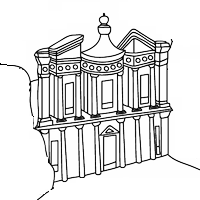Today Pondichery is a territory of the Union and a few thousand French still live there, heirs of the history of the city. We can still see traces of French influence: the consulate, the French lycée, street names still inscribed in French, the kepis of the policemen, the Romain-Rolland library, and so on.
History
Pondichery entered the history of France when the French Company of the Indies bought in 1673 a small coastal village to the sultan of Bijapur. Pondichery thus became the bridgehead of the commercial interests of France in India. However, it was not until 1685 that François Martin, named "director of the coast of Coromandel", put Pondichery on the rails of prosperity. Unfortunately, the friction with the Dutch already established in the region and the death of Martin in 1706 slowed down the development of the city. It was not until 1726 that Lenoir arrived for business to resume. The city was then directed by Dumas in 1735 and then by Joseph François Dupleix in 1742. It was under the mandate of this denier, and thanks to him, that Pondichery will reach its apogee. Thanks to his military victory against the English, he will expand the territory around the city and have much influence in Indian affairs. But the shareholders of the French Company of the Indies, anxious for their commercial interests and seeing with inconsideration the incessant wars with the English, decided to replace it. Dupleix left India on October 14, 1754, taking with him his dreams of a French India.
His replacement, Godeheu, is responsible for dealing with the English. Pondichery was taken and razed by the English on January 16, 1761. France did not recover its counter after the signing of a treaty in 1765. However, is that in 1816 the French will have total control of it without however ever finding there the glory of yesteryear. Pondichery was no more than a stopover for the Far Eastern colonies. It was not until 1954 that France decided to return the city to India.
French Alliance
It is the cultural center of the French of Pondichery. He teaches French, Tamil, English, among others, and has a library. It publishes a monthly newspaper where you can find all the information about the cultural events of the city.
The Ashram of Sri Aurobindo
The ashram was founded in 1926 by Sri Aurobindo and quickly attracted many Westerners in search of spirituality. It is also one of his French followers, nicknamed "the Mother", who will direct the ashram to the death of the guru until his own death in 1973. Today the ashram has all that has of the value in Pondichery and the portraits of Sri Aurobindo and the Mother adorn many shops.
The ashram is open to the public and you can see the cenotaph, constantly watched and flowered by the faithful, Sri Aurobindo and the Mother in the central courtyard.
See also:



















